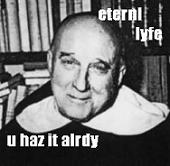I’ve discussed before the question of the criteria by which to judge whether a person is truly a heretic or simply in error about revealed truths. I quoted three criteria, any one of which, according to an ‘approved author’, was by itself a sign of an error being simply an error, not a heresy.
None of the three criteria mentioned seems entirely satisfactory. The first – would the person be ready to accept the Catholic Church’s ruling if he knew it? – certainly applies to the Catholic who is simply in error, but it doesn’t apply to those in other denominations. If they had this disposition, they wouldn’t be in the other denominations (unless some other motive like human respect intervened).
The second – ‘if he knows nothing about the Catholic faith and has never wondered about it’ – is a sufficient proof that the person’s failure to join the Catholic Church is not culpable per se, but it hardly establishes that he has the virtue of faith. He may know nothing about the Catholic faith and yet still culpably reject certain revealed truths taught him by his non-Catholic preacher, and which he finds distasteful, thereby becoming a heretic in God’s sight.
The third suggested criterion – ‘if, wondering about the Catholic faith, he has sought the truth as far as he is able’ – seems like a good one, but it is difficult to apply. How does one judge of someone else, unless one knows him extremely well, whether he has sought the truth as far as he is able?
Yet it seems useful to make some kind of judgement in this matter when dealing with non-Catholics who profess a faith in Christ: not a definitive judgement, since that belongs to God alone, but at least something that can guide one for practical purposes: to form at least a suspicio, if not an opinio.
The problem is that there are two considerations that seem to pull in opposite directions. On the one hand, we are bade think as well of other people as we can. St Thomas tells us that, even though most people are bad, we should still attribute good intentions to other people in particular cases ‘unless manifest signs of their malice appear’; we will be wrong most of the time, he says, but the mind suffers no harm in being wrong about such contingent matters! This principle suggests that we should think of separated brethren as merely erring.
On the other hand, it is to the honour of God and of Christ that the Church should not be difficult to recognise; that it should be, as our Lord has foretold, a city set on a hill. This principle suggests that we should think of separated brethren as culpable.
How can we resolve this antinomy? Perhaps by judging, according to the second principle, that culpable error is more likely in general; while in particular cases refraining for as long as possible from making any judgement, and making a favourable judgement if some judgement is necessary and no ‘manifest signs of their malice’ appear (for example, when a priest agrees to anoint an unconscious non-Catholic).
Yet there is perhaps one other criterion that could be applied effectively. Does the person desire that there should be on earth an infallible guide to the truth that Christ taught to the apostles? The virtue of faith is an inclination to believe all this truth. So whoever has the virtue would surely welcome the idea that there was an infallible guide to what this truth is, as this will make it much easier for him to realise his inclination. He may regretfully think that there is in fact no such guide; but if he desires that there should be, that is a good sign. On the other hand, if he is clear that he doesn’t want there to be any such guide, that he thinks such a thing would be contrary to his own dignity, then we seem to have the ‘manifest signs of malice’ which on St Thomas’s principle would allow the judgement that someone is a heretic.
An example of what I mean by a desire that an infallible authority should exist even while not believing that one does is found in Newman’s 1848 novel, Loss and Gain. In this passage two friends, Charles and Sheffield, both Anglican ordinands, are lamenting the conversion of a third ordinand to the Roman Church. Sheffield speaks first:-
“The idea of his swallowing, of his own free will, the heap of rubbish which every Catholic has to believe! in cold blood tying a collar round his neck, and politely putting the chain into the hands of a priest! … And then the Confessional! ‘Tis marvellous!” and he began to break the coals with the poker. “It’s very well,” he continued, “if a man is born a Catholic; I don’t suppose they really believe what they are obliged to profess; but how an Englishman, a gentleman, a man here at Oxford, with all his advantages, can so eat dirt, scraping and picking up all the dead lies of the dark ages—it’s a miracle!”
“Well, if there is anything that recommends Romanism to me,” said Charles, “it is what you so much dislike: I’d give twopence, if some one, whom I could trust, would say to me, ‘This is true; this is not true’. We should be saved this eternal wrangling. Wouldn’t you be glad if St. Paul could come to life? I’ve often said to myself, ‘Oh, that I could ask St. Paul this or that!'”
“But the Catholic Church isn’t St. Paul quite, I guess,” said Sheffield.
“Certainly not; but supposing you did think it had the inspiration of an Apostle, as the Roman Catholics do, what a comfort it would be to know, beyond all doubt, what to believe about God, and how to worship and please Him! I mean, you said, ‘I can’t believe this or that’; now you ought to have said, ‘I can’t believe the Pope has power to decide this or that’. If he had, you ought to believe it, whatever it is, and not to say, ‘I can’t believe’.”
Sheffield looked hard at him: “We shall have you a papist some of these fine days,” said he.
“Nonsense,” answered Charles; “you shouldn’t say such things, even in jest.”
“I don’t jest; I am in earnest: you are plainly on the road.”
Sheffield, I think we are meant to judge, is a formal heretic; Charles merely a material one.


